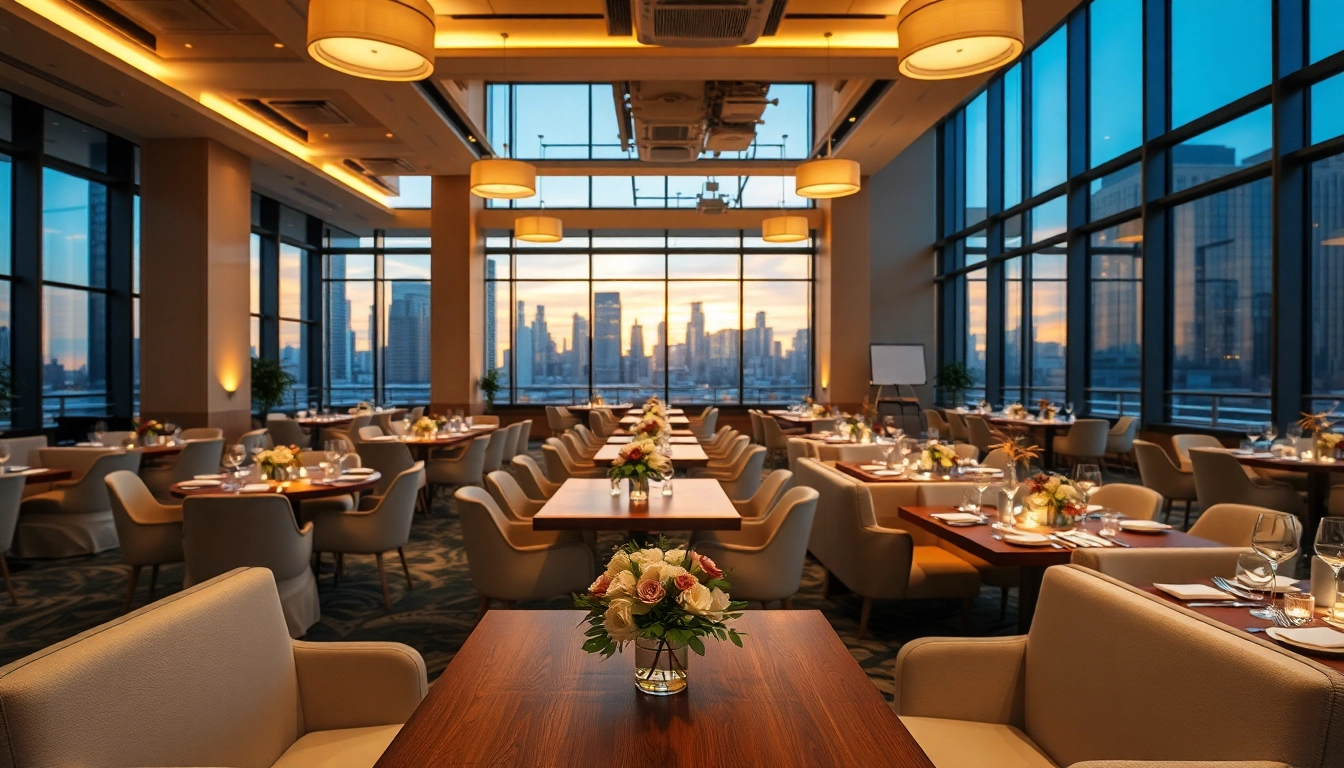Understanding Event Space Options
Choosing the perfect venue for an occasion can set the tone for the event’s success. Whether it’s a wedding, corporate gathering, or a social celebration, the right event space plays a pivotal role. With countless options available, it’s essential to understand what types of spaces are out there, the factors that influence your decision, and budget considerations.
Types of event spaces available
Event spaces come in numerous forms, each offering unique characteristics that could align better with different event needs. Here are the main types of event spaces you might consider:
- Banquet Halls: Traditionally used for weddings and formal receptions, these spaces are designed to host large gatherings, typically adorned with catering facilities.
- Conference Centers: Perfect for corporate meetings, these spaces often include audiovisual equipment, breakout rooms, and accommodation for larger groups.
- Outdoor Venues: Parks, gardens, or outdoor patios can provide a scenic backdrop for events like picnics or weddings in nature’s embrace.
- Lofts and Warehouses: Ideal for a trendy atmosphere, these spaces can be transformed easily with decor and can suit various events from art exhibitions to parties.
- Studios: These versatile spaces are typically utilized for art events or workshops, allowing for creative freedom in set-up.
- Hotels. Many hotels offer configurable event spaces, combining accommodation with event hosting for convenience.
Factors influencing event space selection
When selecting an event space, consider the following factors that could significantly influence your choice:
- Event Type: The nature of the event dictates not just the size but also the necessary amenities. A corporate seminar would benefit from technology support, while a casual birthday might prefer a cozier setting.
- Capacity Requirements: It’s crucial to match the number of guests with the capacity of the venue. Overcrowding can lead to discomfort, while an overly large venue can diminish the event’s atmosphere.
- Location: Accessibility for attendees is vital; a centrally located venue with ample transportation options is ideal.
- Amenities: Ensure the venue offers essential equipment like audio/visual tech, Wi-Fi, and catering options. Consider parking and restroom facilities as well.
Budget considerations for renting event space
Budgeting for an event is paramount, not just for the venue itself but for additional costs that may arise:
- Rental Fees: Most venues charge a base rental fee that can vary significantly based on location and features.
- Catering Costs: If the venue provides catering, be aware of the menu options and their associated costs.
- Decorations and Setup: Depending on the venue, you may need to hire decorators or rent furniture and equipment, which should be factored into your overall budget.
- Insurance: Some venues require event insurance to cover potential liabilities, an aspect often overlooked.
- Service Charges: Review the contract carefully for any hidden fees related to services such as cleaning or security.
Evaluating the Ideal Event Space
Once you have a general understanding of the types of event spaces available and the considerations affecting your selection, the next step is to evaluate the options that best meet your needs. Below are key areas to focus on:
Location and accessibility for attendees
The location of your event space can make or break attendance. Consider the following:
- Proximity to Transportation: Ensure easy access by public transport or offer parking options for drivers.
- Surrounding Amenities: Venues near hotels, restaurants, and attractions add convenience, especially for out-of-town guests.
- Safety and Security: Choose a safe neighborhood and consider the security measures the venue has in place.
Amenities and accommodations within the event space
A good event space offers more than just a room. Here are essential amenities to consider:
- AV Equipment: Check if sound systems, projectors, and screens are available.
- Wi-Fi Access: Connectivity is crucial for many events, allowing for streaming, presentations, or social media interaction.
- Furnishings: Look for tables, chairs, and potentially a dance floor or stage, depending on the event purpose.
Understanding capacity and layout configurations
The layout of the space is just as important as its capacity. Understanding different layout options can help ensure the event flows smoothly:
- Theater Style: Ideal for presentations or talks, seating is arranged in rows.
- Banquet Style: Round tables allow for a more intimate dining experience.
- Networking Layout: Standing spaces can encourage mingling among guests.
Designing a Memorable Experience
Efforts to create a memorable event go beyond just booking a space. Every detail matters in crafting the overall experience of attendees. Here’s how to enhance the event space:
Personalizing the event space to your theme
Tailoring the space to align with the theme of the event creates a cohesive experience. Consider the following:
- Color Palette: Choose a color scheme that resonates with your theme and use decorations, table settings, and even lighting accordingly.
- Branding: Include logos or elements that reflect the brand’s image for corporate events, ensuring they are present in subtle yet impactful ways.
- Themed Decor: From centerpieces to wall art, integrating thematic elements can bring your vision to life.
Lighting and sound considerations for ambiance
Lighting and sound are crucial to setting the mood and enhancing guest experience:
- Lighting: Utilize different lighting techniques to create ambiance—soft lights for elegance, vibrant colors for excitement, or spotlighting for focus.
- Sound Quality: Ensure the sound system is adequate for speeches or entertainment; poor acoustics can diminish the experience.
Choosing decor to enhance the event space
Thoughtful decor can transform a plain event space into an inviting venue:
- Centerpieces: Unique centerpieces can serve as conversation starters and focal points at tables.
- Backdrops: Consider using backdrops for photo opportunities; these can tie back to the event theme and encourage social media sharing.
- Floral Arrangements: Flowers can brighten up a space and should align with your overall color scheme and theme.
Logistics and Planning for Your Event
After setting the stage for a memorable experience, it’s vital to organize the logistics of executing that vision. Effective planning can result in a smoother event process.
Creating a timeline for event space setup
A well-structured timeline ensures that everyone involved knows their responsibilities and deadlines:
- Pre-Event Checklist: Compile an extensive checklist that encompasses setup requirements, vendor arrivals, and guest check-in points.
- Setup Schedule: Allocate specific time slots for each major setup aspect, from AV installations to decor arrangements.
Coordinating with vendors within the event space
Vendor teamwork can be challenging. Effective communication ensures every component of the event aligns:
- Regular Updates: Maintain ongoing communication with vendors leading up to the event to confirm timelines and requirements.
- Designated Points of Contact: Assign a primary contact for each vendor to streamline communications on event day.
Planning for contingencies and unexpected changes
Despite careful planning, things can go awry. Prepare for unforeseen challenges:
- Backup Plans: Always have backup solutions for outdoor events, audio/visual systems, and other critical components.
- Emergency Contacts: Have a list of emergency contacts and local services available for fast problem resolution.
Utilizing Feedback for Future Events
Post-event assessment is vital in refining future endeavors. Understanding what worked well and what didn’t can shape better experiences down the line.
Collecting attendee feedback on the event space
Encourage attendees to offer constructive feedback that can inform your decisions in future events:
- Survey Methods: Use online surveys or physical feedback forms. Simple, clear questions can yield valuable insights.
- Focus Groups: Consider conducting post-event focus groups to gather qualitative data from select attendees.
Measuring success and satisfaction metrics
To assess the success of the event space, consider the following metrics:
- Attendance vs. Registration: Monitor the percentage of attendees who actually showed up versus those who registered.
- Feedback Scores: Analyze feedback to gauge satisfaction levels regarding the venue, amenities, and overall experience.
Adjusting future event space choices based on experiences
Incorporating feedback into future planning is crucial for evolution. Rigorous analysis of collected data can help in making informed venue choices:
- Preference Trends: Identify patterns or specific requests that popular venues could fulfill in the future.
- Cost-Benefit Analysis: Regularly review whether the costs associated with a venue align with the positive feedback received.



